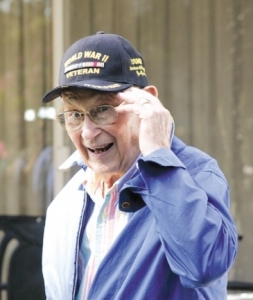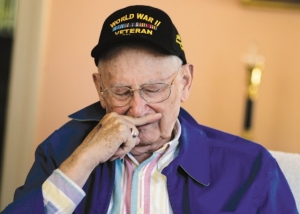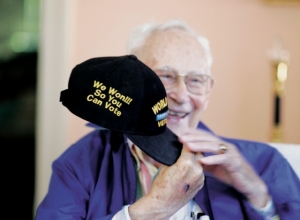Living for their memory
By Kenneth Fine
Published in News on November 11, 2008 1:46 PM

News-Argus/BOBBY WILLIAMS
Wyche Ray salutes while talking about his experience serving in World War II.

News-Argus/BOBBY WILLIAMS
Wyche Ray experiences a range of emotions when he talks about his service during World War II.

News-Argus/BOBBY WILLIAMS
Wyche Ray shows off his World War II veteran ball cap.
Wyche Ray can still hear a gunnery officer assistant pumping machine gun rounds skyward from a Landing Ship Tank anchored just off Omaha Beach.
"We cut it down," the retired sailor said. "We brought it down in a hurry."
He can smell the ocean waves that nearly consumed his vessel during a long trip back from war.
"It scared the living hell out of me. It was the perfect storm," Ray said. "At Omaha Beach, I thought my odds were pretty good -- you know, being one of 10,000 men. But during that storm, I was only one of 32. And with the ocean like it was, I didn't know if I would ever see land again."
So when he did, he found that survival brought with it a sense of duty -- a duty to appreciate every breath for those who never made it home and to pass along the stories they shared as members of the World War II generation.
But that was more than 60 years ago.
Ray still tells their stories, but at 87, he would rather talk about his "lovely wife," Luna -- how her death makes it harder for him to fulfill the promise of savoring each minute.
He walks around the garden they kept to find more beauty in a world without those he has outlived.
"It's nice to look down at the green grass," he said with a heavy sigh. "Yeah, I am still here. I appreciate every day."
That is his mantra.
After all, he "just knows" he and the departed will meet again.
So he goes back to the day he chased bootleggers off the family farm in Wayne County and reveals a smile.
His eyes light up when he talks about the time he sang with a barbershop quartet.
He lets the memories play.
n
Born in Raleigh, Ray came to Wayne County in 1933.
"My mother's people were farmers and we had to eat," he said.
He remembers working on tobacco fields before graduating from Goldsboro High in 1939 and going to Brevard College, where he "learned how to square dance and round dance and everything in between."
"I had a fine time," Ray said.
But a few years later, after attending Officer Candidate School at Northwestern University, he reported to New Orleans.
"That's where I met my ship. It was a large, slow target, the boys used to say," he said. "My folks came up to wish me goodbye with my (first wife). After that, I said, 'Don't expect me anymore.'"
And he boarded a Landing Ship Tank -- one of many naval vessels created during World War II to support amphibious operations by carrying significant quantities of vehicles and cargo and landing troops directly onto an unimproved shore.
After a "terribly long" trip, Ray and his comrades anchored.
"We managed to make D-Day," he said.
But they remained off the shore, just below the Battleship Texas, for several days.
German planes often flew between the vessel and the beach.
"I didn't get much sleep for a week I'm sure," Ray said. "They actually dropped a bomb on us once, but it was a dud, do we didn't see any damage."
He would spend the next several months aboard that LST, making more than 20 round-trips from England to the war zone.
"We went to every seaport on the coast of England to pick up tanks, guns, Jeeps, whatever," he said. "I think we had four rows of Patton's tanks and their personnel on D-Day."
But until that "perfect storm," he was never afraid.
And he never shed a tear.
Not even at the one World War II reunion he attended -- in 1984 at Normandy Beach.
Ray saves his tears for his second wife.
"I just loved her so much," he says, wiping tears from his eyes. "I wish she was still here."
And he saves them for those who died for their country, those this aging veteran has outlived -- even if he waits until no one is looking to shed them.
"I would hope people would spend a little more time in prayer for the men that lost their lives in World War II, the Korean War, the Vietnam War and all the other wars that made the United States what it is," Ray said, looking down to hide the tear rolling off his cheek. "We're here, and they are not. So we are the ones who have to honor them."
